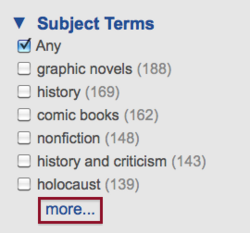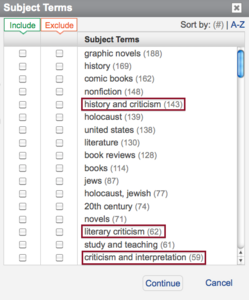Library:Finding Reviews and Criticism
Find Reviews
Book, film, and theatre reviews are useful sources of information. They describe what the book, film, or play is about, providing a summary of the plot and its cast of characters. They also provide the reader with a critical analysis or evaluation of the book. While this analysis will not be as comprehensive in scope as a book of essays or an article from a research journal, a review is often a good way to get started.
Before you begin your search for a book, film, or theatre review you will need the following information:
- title of the book, film, or play
- author, director, or playwright
- date of publication, release, or performance, as reviews usually appear within a few years of a work's first publication.
For a full guide on finding reviews of literature, theatre, and film, use the Book, Theatre, and Film Reviews
Find Criticism
Reviews provided you with an excellent overview of plot, cast, and characters but may not go into depth about the social, political, and cultural importance of a particular work. For a critical analysis or interpretation of a book, film, or theatrical performance, scholarly sources (e.g. articles, books) will provided a more thorough and comprehensive evaluation.
The following guide will show you several ways to find criticism using library resources.
Search by Subject


What is a Subject Search?
Subject searching is a useful way to access items in the library that are on the same or similar topic. Subjects are assigned to every item at the library making it easier to find material. Additionally, subject searching allows you to find items about an author/director or their work.
Search by Subject
To find books about ab author/director or their work, go to the library homepage and select the advanced search from the "Books & Media" tab. This will provide you access to search for books and other physical items in UBC Library.
To begin your search, set the drop down on the right side of the Guided Search Keyword search form to Subject. Type the name of the work or author in the search box and select the "Search" button.
If the name of the book, film, or dramatic production is more than one word (e.g. I Know Why the Caged Bird Sings), change the middle drop down to "as a phrase".
Search Summon
What is Summon?
Summon is a search engine that provides a single starting point to find and access the majority of the UBC Library collections - including books, ebooks, scholarly journals and articles, newspaper articles, dissertations and theses, videos, maps, manuscripts, music scores, digitized items, and more. It is a hosted service from Serials Solutions, with the Summon knowledge base and UBC Library content combined into one unified index.
To use Summon to find criticism, interpretation, or analysis, follow these tips:
Tip 1 - Search the Author's Name and/or Title of the Work
To search for material about your author/director and their work, perform a search in Summon, the "General" tab on the library homepage. If you are looking for information about a specific work, search using the title. If you do not find anything on a particular literary work, try searching for the author/director's name. Remember that books about an author will contain information about there work.
Remember: If you are searching for a title, use quotation marks to search for the entire phrase.
Tip 2 - Use Limits to Narrow to Criticism/Interpretation
Once you have performed the search in Summon, look at the left side of results page to find the variety of ways you can narrow your search. Under the menu marked Subject Terms, select the terms related to criticism, interpretation, and analysis.
-
Select the "more" link for a list of all subject terms.
-
Select the terms related to criticism and interpretation.
Some examples of subject terms that may be useful are:
- criticism and interpretation
- history and criticism
- literary criticism
If there are no subject terms related to criticism or interpretation, perform a search using these terms to try and narrow down your results. For example:
- maus (criticism OR interpretation)
Tip 3 - Read the Abstract or Record
Before selecting the full article to include in your research, do some pre-reading. Hover your mouse over the title of an article to read an abstract of the article. This will give you important information about the author's focus. For books and other media, select the title link and look at the record's subjects, summary, and contents for useful information about the title.
Search Databases
There are several subject specific databases you can use when searching for literary criticism. Using these database will help you narrow down your search to a specific field of study and resources that are more closely related to your topic.
- LCO features biographical and bibliographical information on 20th century and contemporary literary figures (novelists, poets, playwrights, short story writers, and literary theorists), and scholarly and popular commentary from books, journals, magazines, broadsheets, pamphlets, diaries, and newspapers.
MLA International Bibliography
- The MLA International Bibliography, produced by the Modern Language Association of America, consists of bibliographic records pertaining to literature, language, linguistics, and folklore and includes coverage from 1926 to the present.
Additional databases can be found on the following guides:

